I was paralysed by an aggressive form of MS - this is how a Shetland pony helped me get my life back
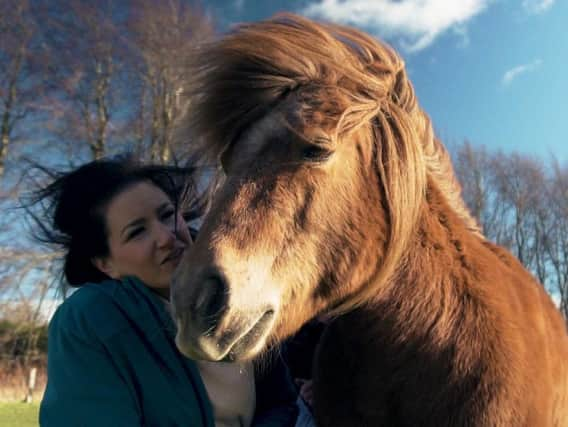

Two years ago Shirley Reise’s life changed beyond any recognition.
The young mother went from working full-time, looking after her son, mucking out stables and riding horses to being completely paralysed from the chest down and almost blind.
Advertisement
Hide AdAdvertisement
Hide AdThe resulting diagnosis of an aggressive form of multiple sclerosis (MS) came as a shock to Shirley, who was 32 at the time.
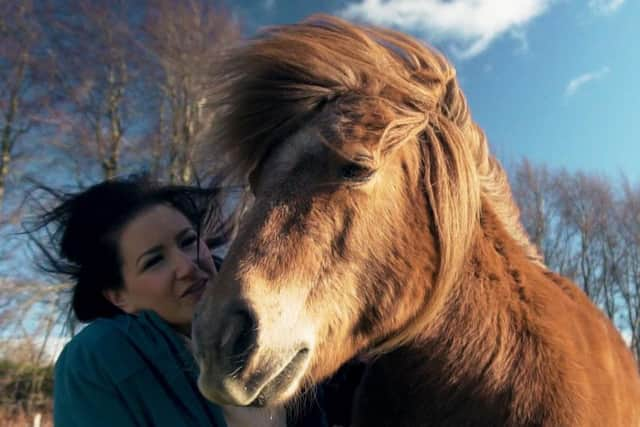

“It was really scary, just to go from that fit to completely incapacitated. I couldn’t see. And having a young son, it was devastating not being able to see his little face.
“I've always had quite an active lifestyle and between the horses and children and work I've always kind of lived life at 100 miles an hour. That's not always great and sometimes it takes quite a shock to pull everything back into context about what matters.”
Understandably, Shirley recalls that she struggled to adapt to her temporary paralysis. “I didn't realise what was going to happen. I mean I was wheelchair-bound and catheterised. In my mind I had quite a bleak outlook.”
Advertisement
Hide AdAdvertisement
Hide AdShirley lives in the tiny village of Pitlessie in Fife with her partner Nigel and son Joseph, where they look after a menagerie of animals.
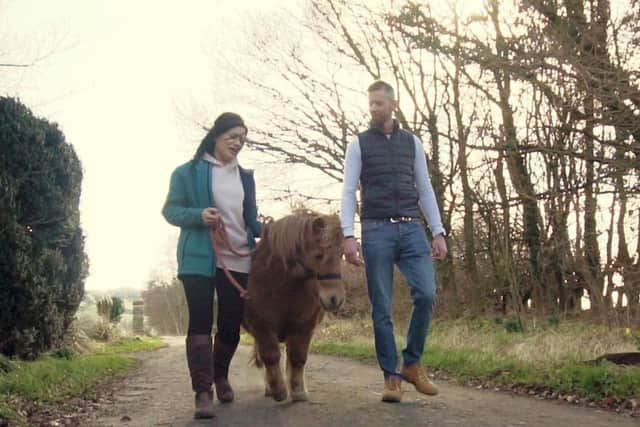

Once the initial shock of the diagnosis had subsided, she began to realise that there had been some warning signs of the condition.
“I think probably my first kind of signs were right after the birth of my son and it was these periods of just numbness and tingling in my thighs,” she says. “They lasted for a few weeks and then they would go away for a couple of months and then come back.
“In retrospect, those instances would have been what we would refer to now as relapses or flare-ups of MS but at that point I found it to be so insignificant I just didn't really pay much attention to it.
Advertisement
Hide AdAdvertisement
Hide Ad“Then one morning I woke up and I was numb all the way down to my ankles and all the way up to my chest on one side, and progressively throughout one period of 24 hours it spread across my tummy to the other side.
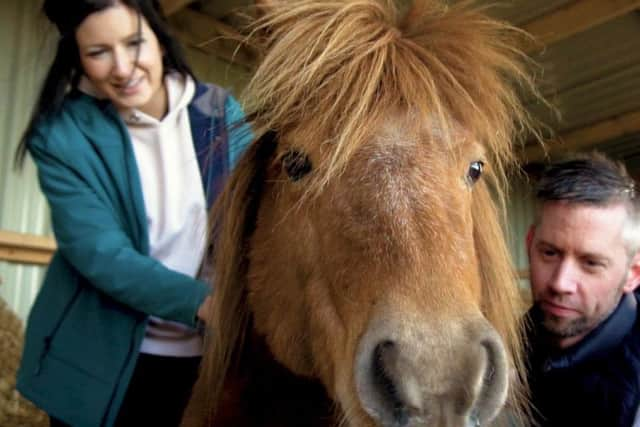

“I was referred for an MRI scan straight away and they discovered that my brain and my spinal cord were covered in lesions, indicating that something was wrong.”
Looking back now, Shirley recalls how the condition profoundly affected not just her health but her relationship with her family too.
“I remember my son bringing in a picture into me and saying ‘Mum, look at this picture I’ve drawn’ and I couldn't see it. And I just thought I'd give anything to be able to see that picture. I will never take that for granted.”
'Miraculous'
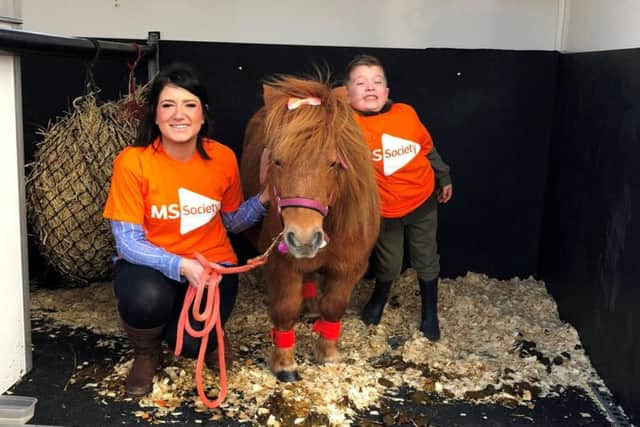

Advertisement
Hide AdAdvertisement
Hide AdFor Shirley, what made all the difference was a drug called Tysabri, which can cut the severity of relapses by 70% and slow down the rate of disability for MS sufferers.
“It’s a monthly infusion at the hospital and that has restored me back to nearly full vision,” she says. “I do have to use a crutch sometimes but I've gone from a wheelchair to two crutches to one crutch and only needing that every so often - it’s miraculous.”
As well as the medical treatment, Shirley puts her recovery down to the help of a furry friend, Shetland pony Winnie.
Winnie the Shetland pony
“I remember saying to family members, ‘Can you help me get out to the field and sit me there? I know I can't walk but if you can help me get to the field and just plonk me there’, and you could see them looking like ‘In a field of horses? Is that wise?’
Advertisement
Hide AdAdvertisement
Hide Ad“Winnie would always come running up to me and she would stand with me for hours. I would scratch her and talk to her about inane rubbish - she just never left my side.”
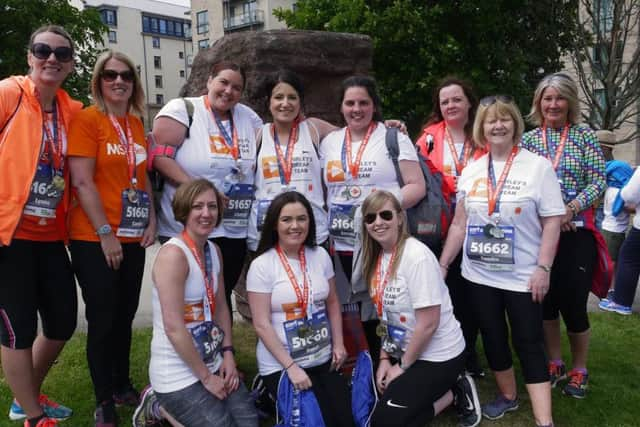

This loyalty sparked an ambitious idea for Shirley: to complete the 5k race at the Edinburgh Marathon Festival last year, and bring Winnie along with her.
Unfortunately Winnie couldn’t join her on the day over concerns that she could become stressed, but Shirley completed the race with the help of her workmates at Fife Council.
“One day I went to a team meeting and at the end they said, ‘Now Shirley, we have something for you’, and they put a box in front of me. Everyone started taking their phones out and when I opened the box it was the registration forms of everyone in my team. They were going to do the 5k with me.
Advertisement
Hide AdAdvertisement
Hide Ad“Their mission was to get me over that finish line regardless of how, as long as I got over the finish line.”
Despite not being there with Shirley on the race day, Winnie helped her train for the race when her mobility was poor. “The thing about Winnie is she'll let you lean on her when you're not feeling too good. She's a great support in all senses.
“She's so oddly shaped and clumsy and cute and she just puts a smile on everyone's face.”
Shirley was able to raise £3,000 over a very short period of time, after setting herself a goal of £500. “It was brilliant just to see that support and how many people really cared and wanted us to do well,” she says.
'Nearly back to normal'
Advertisement
Hide AdAdvertisement
Hide AdTen months on from the race, Shirley is progressing with her recovery, and looking forward to getting married later this year.
“I cannot wait for what the future holds - after lots of rehab and medication I can live relatively normally and that includes time with my son and partner. I have lots of things to look forward to – a wedding being top of the list.
“My life is back to looking after the horses, ducks, dogs, rabbits. I mean it is absolute mayhem here, but it's life for me and I love it.
“I'm able to work full-time again, my life has come nearly back to normal and I just feel really blessed - it's given me a completely different outlook on life.”
Advertisement
Hide AdAdvertisement
Hide AdNow Shirley is keen to help raise awareness of MS, a condition which affects around 11,000 Scots, and she uses her own experience to help educate kids on regular school visits.
“In Scotland we have the highest concentration of MS sufferers. So it’s really important that other Scots are aware of that, why that is and what the signs are. And it's not to scaremonger, it's just to make sure that people are aware.”
She’s also grateful to the scientific advances that have allowed her to lead a normal lifestyle again, while mindful of the financial costs involved.
“I remember a recent visit to the GP. She turned to me and said ‘You know the drug that you're on right now? Ten to fifteen years ago it really wasn't available. So had you been diagnosed that far back there would not really have been anything for you’.
Advertisement
Hide AdAdvertisement
Hide Ad“It shows how important the fundraising element is because that money is what's ploughed into medication and research and what is making it possible for people like me to be well and healthy again and look after my son.”
What is MS?
Multiple Sclerosis is a neurological condition which affects more than 100,000 people in the UK - and 11,000 in Scotland. It is often painful and exhausting and can cause problems with how sufferers walk, move, see, think and feel. It is unpredictable and different for everyone.
The MS Society supports people with MS and has a free confidential helpline on 0808 800 8000 which offers information and support on everything from being newly diagnosed to treatment options. More information can be found on their website at www.mssociety.org.uk.
Read more on MS: